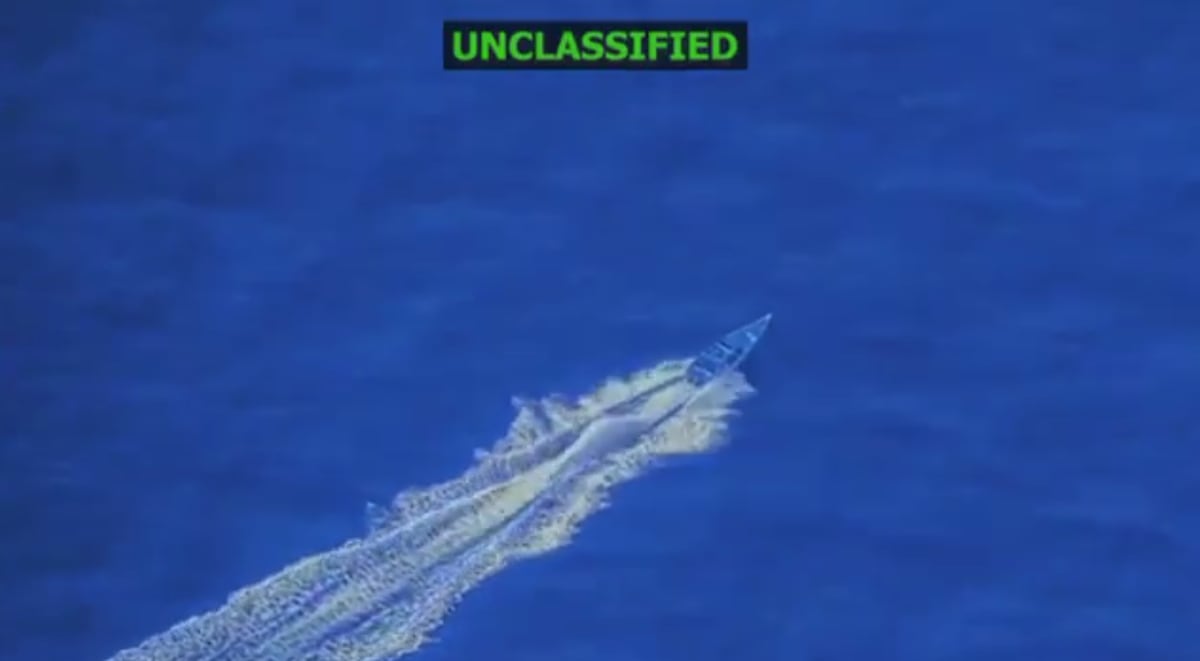The Houthis in Yemen sank their second ship in two days when a Liberian-flagged cargo ship, Eternity C, went down in the Red Sea early Wednesday morning.
That follows the recent sinking of another Greek-owned merchant vessel, the Magic Seas, which the Houthis attacked on July 6 in a four-hour assault involving sea drones and militants aboard skiffs launching RPGs. The 22-person crew was rescued by a passing merchant vessel and dropped off in Djibouti. The Houthis later boarded and sank the abandoned Magic Seas with explosives.
At least four of the Eternity C’s 25-person crew died; three were from the Philippines, and another was from Greece. Ten other crewmembers have been rescued from the sea, according to the European Union’s regional maritime force, Operation Aspides, writing Thursday morning on social media. But the rest of the crew are still missing, and at least some were allegedly picked up by the Houthi naval forces.
The Houthis attacked the Eternity C for 16 hours using ballistic and cruise missiles, according to the Yemeni group, which posted videos purporting to show the launches. The ship was largely empty after visiting Somalia from Houston with a load of soybeans. At least two Houthi missiles landed direct hits on the Eternity C, as illustrated in Houthi drone footage. But the Houthis also appear to have placed explosives on the side of the vessel to ensure its sinking, maritime analyst Sal Mercogliano explains in his video on these developments.
Magic Seas and Eternity C are the first commercial vessels the Houthis have attacked since December. They’re also the third and fourth vessels sunk by the Houthis since they began assaulting commercial ships in November 2023, following the surprise attack on Israel by Hamas militants one month prior. (The first two were the Belize-flagged MV Rubymar, which sank in March 2024; and Greek-owned bulk carrier Tutor, which sank on June 18, 2024.)
And the U.S. naval response? “There are two American destroyers believed to be operating in the Red Sea,” Jon Gambrell of the Associated Press reports. “However, the ships attacked had no U.S. ties and a ceasefire between the Houthis and America announced after the bombing campaign earlier this year still appears to be holding.”
Relatedly, “The U.S. military has two aircraft carriers in the Mideast, the USS Nimitz and the USS Carl Vinson, but both likely are in the Arabian Sea, far from the site of the attacks,” Gambrell writes.
Official U.S. reaction so far: “The United States condemns the unprovoked Houthi terror attack on the civilian cargo vessels MV Magic Seas and MV Eternity C in the Red Sea,” the State Department said in a statement Tuesday, adding, “The United States has been clear: we will continue to take necessary action to protect freedom of navigation and commercial shipping from Houthi terrorist attacks, which must be condemned by all members of the international community.”
What lies ahead: Likely more Houthi attacks. That’s because, as Mercogliano noted in his video, “What the Houthi are saying is that they’re targeting vessels that are in any way connected to Israel, either through the ship themselves or the parent company. This means one out of every six ships on the world’s oceans are going to be connected with this.”
“This is a massive mess,” Mercogliano said. “The European Union’s Operation Aspides does not have the naval platforms to do anything. The U.S. just spent the first half of 2025 bombing the crap out of the Houthis in Operation Rough Rider. The Vinson and Nimitz battle group are out in the Indian Ocean. The Ford battle group is working up off the east coast of the United States; it’ll be weeks before it’s in the Mediterranean. I’m not sure what can be done.”
His advice: “I think we have to do what has been working over the past year, and that has been targeted convoy operations escorting vessels through the Red Sea because you are not going to diminish the Houthi.”
The U.S. may have to go back even further to the Navy’s tanker-escort mission Operation Earnest Will during the Iran-Iraq war in 1987, Mercogliano suggested.
Houthi statement: “We will continue our military operations in support of the oppressed Palestinian people…until the aggression against Gaza stops and the siege is lifted,” the group said in a statement. CNN has more.
Welcome to this Thursday edition of The D Brief, a newsletter dedicated to developments affecting the future of U.S. national security, brought to you by Ben Watson and Bradley Peniston. Share your tips and feedback here. And if you’re not already subscribed, you can do that here. On this day in 1943, the Allied invasion of Sicily began and ultimately freed the island from the grips of Fascist Italy and Nazi Germany by mid-August.
Nuclear deal
UK, France will work on their nuclear arsenals together under a first-of-its-kind deal meant to help deter Russian aggression, the New York Times reported Thursday. Prime Minister Keir Starmer of Britain and President Emmanuel Macron of France are to announce the details today.
Background: Nuclear analyst Ankit Panda laid out the logic of such a deal back in March. “Europe must be clear-eyed about the geopolitical tectonic shifts underway and their consequences. Chief among these is the idea that, given political tides in Washington, relying on the United States for the long haul is intolerable,” Panda wrote in Defense One.
“While little can be done overnight to replace the load-bearing role that the United States once played in European security, including with its nuclear weapons, Macron’s call should galvanize the continent’s capitals into an interrogation of the promises and limits of nuclear deterrence. As Europeans enter this new strategic debate, several questions will arise, and they won’t have simple answers.” Read on, here.
Russia
Moscow’s 2022 deal to produce Iranian Shahed drones was key to its recent record-breaking barrages, the Wall Street Journal reported Thursday.
Notable: “More than 24,000 drones have barreled toward Ukraine’s towns and cities since the start of this year, according to an analysis of Ukrainian figures by the Center for Information Resilience, a U.K.-based open-source investigations organization. Wednesday’s attack included more drones in a single night than in the entire month of July last year.”
“They’re constantly beating new records,” said Yuriy Ihnat, a spokesman for Ukraine’s air force. Read on, here.
Developing: Secretary of State Marco Rubio and Russian Foreign Minister Sergei Lavrov met for 50 minutes today in Malaysia, emerging with what Rubio called “new ideas” for Russia-Ukraine peace talks. AP reports, here.
Update: Russia has seized $50 billion in assets since invading Ukraine. Reuters: “The conflict has been accompanied by a significant transfer of assets as many Western companies fled the Russian market, others’ assets were expropriated and the assets of some major Russian businesses were seized by the state.” More, here.
Around the Defense Department
ICE agents have been ordered to “enhance” security at three Marine Corps bases. A pilot program has stationed Immigration and Customs Enforcement agents at Camp Pendleton in California, Marine Corps Base Quantico in Virginia and Marine Corps Base Hawaii. “The move, aimed at bolstering security around these bases, has raised as many questions as it seeks to answer,” Fox’s Sarah Rumpf-Whitten reported Monday.
A Pentagon statement said the effort “aligns with the enhanced security measures we are implementing at all our installations worldwide to deter unauthorized installation access by foreign nationals” and that the ICE presence “enhances installation-level force protection by increasing visibility, coordination, and threat awareness at critical access points and in surrounding areas.” Read more, here.
Additional reading:
Read the full article here








Leave a Reply